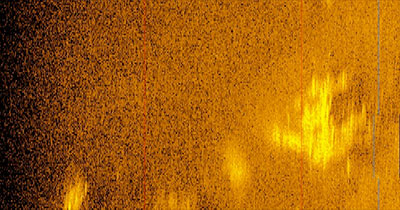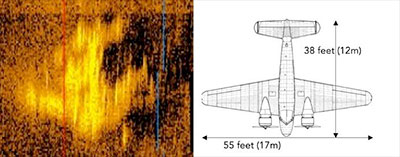|
|

|
|
Author
|
Topic: Amelia Earhart's aircraft believed to be found
|
Robert Pearlman
Editor Posts: 53462
From: Houston, TX
Registered: Nov 1999
|
 posted 01-31-2024 10:48 AM
posted 01-31-2024 10:48 AM
   
Deep Sea Vision release Amelia Earhart's Aircraft Believed to be Found by Unconventional Team of ExpertsAfter an extensive deep-water search, a talented group of underwater archaeologists and marine robotics experts have unveiled a sonar image that may answer the greatest modern mystery - the disappearance of Amelia Earhart. Captured westward of Earhart's projected landing point, in a swath of the Pacific untouched by known wrecks, the image reveals contours that mirror the unique dual tails and scale of her storied aircraft. Deep Sea Vision (DSV), a Charleston, South Carolina-based marine robotics company led by CEO Tony Romeo, was pursuing the missing aircraft using the "Date Line theory" of her disappearance nearly 87 years ago. Originally theorized in 2010 by Liz Smith, a former NASA employee and amateur pilot, the Date Line theory attributes Earhart's disappearance to simply forgetting to turn the calendar back one day as she flew over the International Date Line. Smith suggested that Amelia's navigator, Fred Noonan, miscalculated his celestial star navigation by simply forgetting to turn back the date from July 3 to July 2 as they flew across the Date Line, creating a westward navigational error of 60 miles.  
As a private pilot, DSV's CEO Tony Romeo and his brother Lloyd Romeo believed the idea had merit and began digging deeper into the celestial math Smith had laid out. The Romeos came to believe that after 17 hours of exhausting flying it was quite plausible that Earhart's navigator Fred Noonan could have made such an error. The theory and area described by Smith had never been searched – until now. Romeo was not surprised to find the aircraft intact, saying, "We always felt that she [Earhart] would have made every attempt to land the aircraft gently on the water, and the aircraft signature that we see in the sonar image suggests that may be the case." Romeo hopes they can answer that question very soon. "We're thrilled to have made this discovery at the tail end of our expedition, and we plan to bring closure to a great American story." The Deep Sea Vision team, a diverse group of experts, proved that diligent efforts and next-generation technology could take on the monumental task of finding Earhart's Lockheed Electra. For 90 days, the DSV team searched across 5,200 square miles of the Pacific Ocean floor, more than all previous searches combined. Their secret weapon, the HUGIN 6000, is an autonomous underwater marvel, modified by their own hands to outperform any underwater submersible used before. It is the most capable system available in the world, able to reach full ocean depth. DSV further improved the equipment by modifying the side scan sonar to search nearly 1,600-meter-wide swaths instead of the normal 450 meters. The changes were made possible by DSV President of Operations, Craig Wallace, who Romeo recruited directly from the sonar manufacturer to help put the expedition together. The team launched the expedition out of a tiny island in the Pacific Ocean about a four-day cruise from where the discovery was made. Each dive of the sonar equipment lasted nearly two days and collected several terabytes of data scanning the sea floor. The international team worked around the clock, analyzing the imagery using cutting edge software that was being written as the mission went along. Their discovery, made at the conclusion of the expedition, was a testament to technological triumph and the unyielding pursuit of closure for an American icon. Earhart's fate has been the source of speculation and conspiracy theories since her mysterious disappearance in 1937. She remains a defining icon of her generation, women's rights and a pioneering spirit of early aviation. DSV believes they are one step away from closure to this great mystery and will be keeping all other information, including the exact location, strictly confidential. While Romeo is very optimistic about their find, he acknowledges that there was a great deal of internal debate about whether to release the sonar image publicly. Many prominent authorities have been working to validate DSV's findings, including Dorothy Cochrane, Aeronautics Curator at the Smithsonian's National Air and Space Museum, who stated, "We are intrigued with DSV's initial imagery and believe it merits another expedition in the continuing search for Amelia Earhart's aircraft near Howland Island." Unlocking the mystery of Earhart's whereabouts is one of several projects for Romeo and Deep Sea Vision. The investment they spent to launch the company is already leading to more exciting projects. DSV has already concluded a yet to be announced project in the Pacific and is currently providing their technology for a longer-term project in Australia. About Deep Sea Vision Deep Sea Vision is a marine robotics company specializing in deep ocean exploration and survey. With the latest variant of the HUGIN 6000, Deep Sea Vision owns the most advanced autonomous underwater vehicle (AUV) commercially available. Deep Sea Vision was founded by Tony Romeo, a graduate of the United States Air Force Academy, and led by Operations Chief, Craig Wallace, who was the former HUGIN product manager at Kongsberg Maritime. Deep Sea Vision is aiming to become the market leader in mineral exploration and habitat mapping over the next decade. |
Grounded!
Member Posts: 571
From: Bennington, Vermont, USA
Registered: Feb 2011
|
 posted 02-01-2024 02:57 PM
posted 02-01-2024 02:57 PM
   
Hard to tell of course, but that plane looks like it has a more swept-wing than hers. |
SpaceAngel
Member Posts: 499
From: Maryland
Registered: May 2010
|
 posted 02-01-2024 06:24 PM
posted 02-01-2024 06:24 PM
   
Wouldn't the aircraft been desolved by water after so many years? |
Robert Pearlman
Editor Posts: 53462
From: Houston, TX
Registered: Nov 1999
|
 posted 02-02-2024 11:45 AM
posted 02-02-2024 11:45 AM
   
Corrosion (and erosion) does occur, but there are plenty of examples of metal wrecks lasting for long periods on the ocean floor without significant structural harm, e.g. Liberty Bell 7, the Saturn V F-1 engines and Titanic. (A quick Google search can show you many examples of planes sitting on the sea floor.) |
Blackarrow
Member Posts: 3770
From: Belfast, United Kingdom
Registered: Feb 2002
|
 posted 02-02-2024 12:01 PM
posted 02-02-2024 12:01 PM
  
One important piece of information which is missing from that long report is the depth at which the aircraft was imaged. I understand it was around 16,000 feet. The 'Titanic' at around 12,000 feet down had not corroded away when the wreck was found in the mid-1980s (but seems to be crumbling away by now). I believe the cold temperatures and lack of oxygen in the water reduced corrosion. A quick Google search suggests similar temperatures on the Pacific ocean bed. It seems obvious that the thin metal of an aircraft is going to corrode more quickly than the structure of an ocean liner, but - to state the obvious - the image seems to show a largely intact aircraft, so it clearly hasn't corroded away. Either it's a much more recent crash-site or it's Earhart's aircraft in cold enough water to preserve its structure. I believe the investigators are going back with better equipment, including cameras. Let's see what turns up! |
PeterO
Member Posts: 460
From: North Carolina
Registered: Mar 2002
|
 posted 02-02-2024 01:28 PM
posted 02-02-2024 01:28 PM
   
It seems to me unlikely that the plane would fall through a 16,000 foot water column and gently land in a level attitude, leaving it intact. If one were to stop a plane in midair and let it drop, it would nose down as it fell, so it should do the same in the water column.It's also well-documented that Earhart was a mediocre pilot who had particular problems with takeoffs and landings, so I doubt she would have made a successful open ocean ditching leaving the airframe intact, especially after 17 hours in the air. |
Jim Behling
Member Posts: 1948
From: Cape Canaveral, FL
Registered: Mar 2010
|
 posted 02-02-2024 03:50 PM
posted 02-02-2024 03:50 PM
   
quote:
Originally posted by PeterO:
...so it should do the same in the water column.
It could have maple leaf or seed down. |
ejectr
Member Posts: 2024
From: Killingly, CT
Registered: Mar 2002
|
 posted 02-03-2024 09:23 AM
posted 02-03-2024 09:23 AM
   
Let's remember that the plane was mostly aluminum to make it lighter. Not a metal that corrodes readily, even in salt water. |
damnyankee36
Member Posts: 75
From: Alamogordo, NM USA
Registered: Aug 2017
|
 posted 02-05-2024 12:32 PM
posted 02-05-2024 12:32 PM
   
quote:
Originally posted by PeterO:
...so it should do the same in the water column.
And, after it hit the bottom, would probably wind up on it's belly, possibly on its roof.And, has Jim mentioned, it could have gone into a flat spin. I would also imagine it would have sunk slowly enough so as not to cause much damage upon impact. |
Axman
Member Posts: 606
From: Derbyshire UK
Registered: Mar 2023
|
 posted 02-06-2024 05:17 AM
posted 02-06-2024 05:17 AM
   
I'm not happy (as someone else has also mentioned) about the wing shape — too swept back. And the engine nacelle, which definitely will not have rotted away, nor have been crushed by impact on the seabed, should be more prominent. |
SpaceAholic
Member Posts: 5406
From: Sierra Vista, Arizona
Registered: Nov 1999
|
 posted 11-06-2024 12:52 AM
posted 11-06-2024 12:52 AM
   
Tony Romeo, who earlier this year said he believed he had found Amelia Earhart's long-lost aircraft, now says what he found was a rock. "I'm super disappointed out here, but you know, I guess that's life," said Tony Romeo, a pilot, former U.S. Air Force intelligence officer and commercial real-estate investor from Charleston, S.C., who led the search and was speaking to The Wall Street Journal from a boat on the Pacific Ocean.Romeo's hunt for Earhart's famed aircraft came up empty on Friday when he said he and his crew got high-resolution photographs and sonar images of the object they previously thought might be her iconic Lockheed 10-E Electra. The new images, Romeo said, revealed that the object was an "unfortunate rock formation" in the shape of a plane on the Pacific Ocean seafloor. He declined to share the photos, offering only a sonar image of the rock formation. |
p51
Member Posts: 1786
From: Olympia, WA
Registered: Sep 2011
|
 posted 11-06-2024 05:32 PM
posted 11-06-2024 05:32 PM
   
You guys cannot believe how many times it's been 'declared' this plane has been found. A group called TIGHAR announced it so many times with next to no evidence whatsoever (the funniest was a rotted rubber woman's shoe heel that wasn't even her size shoe), it became a theme among airplane preservation groups and a punchline to almost any joke regarding anything missing.That said, this data looked much more solid than what others declared earlier. There are so many competing stories about what happened to the plane and Earhart/Noonan afterward, it will take ONLY the plane being lifted out of the water and the serial numbers matching the Electra putting it all to rest. | |
Contact Us | The Source for Space History & Artifacts
Copyright 1999-2024 collectSPACE. All rights reserved.

Ultimate Bulletin Board 5.47a
|
|

|
 advertisement advertisement

|













